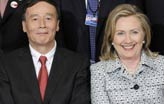Diplomatic and Military Affairs
Obama, Netanyahu face tense meeting on Mideast
Updated: 2011-05-20 13:23
(Agencies)
WASHINGTON - US President Barack Obama's endorsement of a longstanding Palestinian demand on the borders of their future state sets the stage for what could be a tense meeting with Israeli Prime Minister Benjamin Netanyahu on Friday.
Netanyahu, who has had strained relations with Obama, headed for Washington saying the president's vision of a Palestinian state on the borders of 1967 - as part of his vision for an elusive US-brokered peace deal - could leave Israel "indefensible."
The White House talks had never been expected to yield any significant progress to revive long-stalled peace talks, but now that prospect seemed dimmer than ever.
Obama, in a policy speech on Thursday on the "Arab spring" uprisings across the Middle East, laid down his clearest markers yet on the compromises Israel and the Palestinians must make for resolving their decades-old conflict.
His position essentially embraces the Palestinian view that the state they seek in the West Bank and Gaza should largely be drawn along the lines that existed before the 1967 war in which Israel captured those territories and East Jerusalem.
On the eve of Netanyahu's visit, it was seen as a message that Obama expects Israel to eventually make big concessions.
"The viability of a Palestinian state cannot come at the expense of Israel's existence," Netanyahu said in a statement before flying to the United States for his talks with Obama.
Obama's first outright declaration of his stance on the contested issue of borders could help ease doubts in the Arab world about his commitment to acting as an even-handed broker.
But the Democratic president quickly came under fire from Republican critics, who accused him of betraying Israel, the closest US ally in the region. Pushing Netanyahu risks alienating the Jewish state's base of support among the US public and in Congress as Obama seeks re-election in 2012.
"This approach undermines our special relationship with Israel and weakens our ally's ability to defend itself," said House Republican Majority Leader Eric Cantor.
Israelis taken aback
While Obama also had tough words for the Palestinians, Israeli officials were especially taken aback by his blunt language, including criticism of "settlement activity" and its continued occupation of Arab lands.
There was no word on whether Netanyahu, who heads a right-leaning, pro-settler coalition, had been forewarned.
Palestinian President Mahmoud Abbas welcomed Obama's efforts to renew the talks that collapsed last year.
Obama has little to show for his peace efforts since taking office. His last bid collapsed when he backed down from confronting Israel over settlement building in the West Bank.
Despite the tensions, Obama has carved out three hours for Netanyahu on Friday, including a working lunch. Visits have not always gone smoothly, however.
In March of last year, Netanyahu was left cooling his heels while Obama went to the White House residence for dinner with his family, widely seen in Israel as a snub.
In Thursday's speech, Obama said: "We believe the borders of Israel and Palestine should be based on the 1967 lines with mutually agreed swaps" of land.
While this has long been the private view in Washington, Obama went further than US officials have gone in the recent past, when they described such a solution as a Palestinian aspiration but did not embrace it as their own.
Obama, in a BBC interview after his speech, made clear that Israel is "going to have to feel confident about its security" before it will be expected to agree to a border arrangement.
Obama also delivered messages that will be hard for the Palestinians to swallow, suggesting their effort to win UN membership for a Palestinian state is doomed and that they have a lot of explaining to do about a reconciliation deal with Hamas, which the United States regards as a terrorist group.
To reassure Israelis, Obama recommitted to Israel's security and said any future Palestinian state must be "non-militarized," something Netanyahu has demanded.
But he warned Israel: "The dream of a Jewish and democratic state cannot be fulfilled with permanent occupation."
In a pointed reply, Netanyahu said he expected "to hear a reaffirmation from President Obama of US commitments made to Israel in 2004" - an allusion to a letter by then-President George W. Bush suggesting the Jewish state may keep big settlement blocs as part of any peace pact.
Palestinians say settlement expansion is aimed at denying them a viable state, and successive US administrations have shielded the Jewish state from UN Security Council resolutions condemning such activity.
Specials

Comments on S&ED
The China-US Strategic and Economic Dialogue in Washington earlier this month achieved some remarkable results.

The song dynasty
There are MORE THAN 300 types of Chinese operas but two POPULAR varieties are major standouts

Sino-US Dialogue
China and the US hold the third round of the Strategic and Economic Dialogue from May 9-10 in Washington.